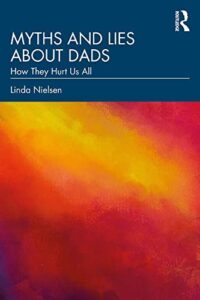Sept 5, 2023 – Baby Attachment Myths this week!
Gene C. Colman Introduction: Let’s continue with our examination of Prof. Neilsen’s work. We continue to present excerpts from Prof. Linda Nielsen’s latest book, “Myths and Lies About Dads”. It’s those myths, stereotypes and outright lies about dads that tend to form powerful blockages against legislating a rebuttable presumption of Equal Shared Parenting. And while Prof. Nielsen not only shatters those myths, she expertly amasses a wealth of solid social science data that supports the key importance of both parents in their children’s lives. Throughout, the bolding and italics are mine.
Here is today’s highlighted myth – lie: Baby bonds and attachment: Mom wins.
From page 59:
Another attachment myth is that researchers can measure how attached a child is to each parent. In other words, there is a “scientific” way of finding out whether dad is more important or has a better relationship with the child than mom does. For that matter, it would be a way to finding out whether any particular parent has a better relationship with their child than some other parent. That would be a helpful test, now wouldn’t it? Except, there is no such test. What confuses people is that there are tests called “attachment” tests—which is an very misleading name because these tests do not measure the kind of relationship, attachment, or bond a child has with the parent. 28 And the tests certainly can’t tell us which parent is more important or closer to the child. Put in the very simplest terms, these are “stress” tests to see how a very young child reacts towards their parent when they are placed in a stressful or extremely challenging situation—not how the child behaves in their normal day to day interactions with their parents. When under stress, the child who comfortably goes to the parent for reassurance and comfort is classified as having a secure attachment style. And the child who avoids or ignores the parent or who seems confused or angry about asking for comfort is classified as having an insecure attachment style. These tests have nothing to do with the parents’ relationship with the child. And this is why some children who behave in an insecure way during the stress test have very secure, loving relationships with their parents, while children who behave in a secure way on the test sometimes have an unhealthy or even an abusive relationship with their parent. 29
Here are the three take-away messages about babies’ attachments to their fathers.
ONE: First, the young child’s emotional bond to dad is just as strong and just as important as the bond to mom.
TWO: Second, this is true even though most dads are not able to spend nearly as much time with their babies as moms spend.
THREE: Third, babies form a bond with dad and mom at about the same point in time, around seven months of age. In short, we need to put those baby attachment myths to rest.
 Click on the book here to easily order.
Click on the book here to easily order.
Stay tuned to upcoming ESP Thoughts of the Day for more insightful excerpts from Prof. Nielsen’s book.
Gene C. Colman comments further
Prof. Nielsen’s attachment comments remind me of my earlier days when I did a fair amount of child protection work. In those days, judges and children’s aid societies just loved to run their so called “attachment assessments” with their so called “attachment experts” that would almost always come out with negative comments against the parents (usually the mom) and would provide cover of sorts to ordering Crown Wardship – ie. cut all bonds finally. Do a true parentectomy – and preferably via a Summary Judgment Motion that a poor self represented parent or an underpaid Legal Aid lawyer had almost no chance of beating. I hated those assessment back then and I hate them still today. Jump forward a couple of decades and we are still today in 2023 faced with myths and lies about dad’s attachment to his infant. These disgusting and sexist myths, stereotypes and outright lies about dad/infant bonding drive this sort of litigation. Kids, and especially infants, need two parents (and don’t forget the grandparents either). It’s time for a change, Canada. Isn’t it just obvious?
Link to Gene C. Colman’s Equal Shared Parenting Web Page
Link to past issues of the ESP Thought of the Day publication




